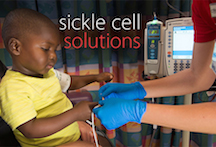 A new treatment for sickle cell disease developed at the Washington University School of Medicine in St. Louis is showing great promise. The procedure involves an umbilical cord blood transplant from an unrelated donor.
A new treatment for sickle cell disease developed at the Washington University School of Medicine in St. Louis is showing great promise. The procedure involves an umbilical cord blood transplant from an unrelated donor.
In the past, this procedure has been difficult because patients first had to receive a high-dose of chemotherapy before receiving the umbilical cord blood transplant. The chemotherapy could have unwanted side-effects. The new procedure uses low-does chemotherapy that produces fewer side effects.
The procedure is delicate and patients must continue to receive blood transplants until the patient begins to produce his or her own cells. There is a high risk of infection and rejection of the new cells.
So far the results are encouraging and it is hoped that new national trial will be approved by the end of the year. A more detailed summary of the new procedure can be viewed here.
The research is of particular importance to African Americans. While people of any race can have the sickle-cell trait, the disease is far more common among African Americans than it is among Whites. About one in every 400 African Americans is born with the sickle-cell trait.











